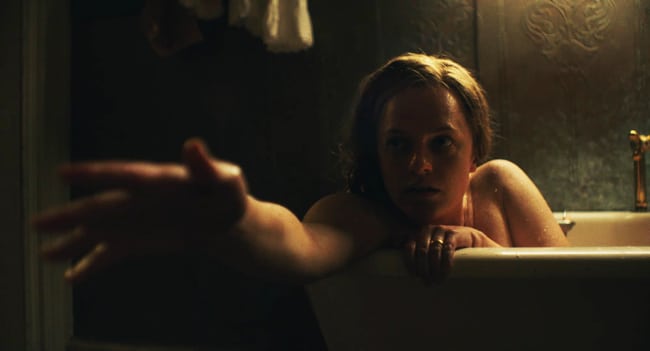
Dir.: Josephine Decker; Cast: Elisabeth Moss, Odessa Young, Michael Stuhlbarg, Logan Lerman; USA 2020, 107 min.
Making a name for herself with a stylish array of imagined dramas US auteur Josephine Decker moves into the arena of real life with this febrile portrait of horror writer Shirley Jackson (1916-1965) whose most popular novel ‘The Haunting of Hill House’ has been filmed on numerous occasions, the last being as a ten-episode long production on Netflix.
Based on ‘Shirley: A Novel’ by Susan Scarf the film takes place in 1964 in North Bennington, Vermont – which seems a strange a strange choice, since Scarf actually wrote her novel ‘Hangasman’, whose writing process is the central part of the feature, in 1951. The narrative centres on two couples, the middle-aged Shirley (Moss) and her English professor husband Stanley (Stuhlbarg), and their much younger house guests Rose (Young) who is pregnant with her first child, and her academic husband Fred (Lerman), who tries to get a tenure at Bennington College, as Stanley’s assistant. There are shades of Albee’s Who is Afraid of Virginia Woolf, but, more importantly, Rose and Fred are actually invented characters. But in staying away from a strictly biographical narrative, Decker and her writer Sarah Gubbin enhance the richness of the storytelling – even though the ‘deletion’ of the couple’s four kids, who would have been around in 1951, is another puzzling decision. Shirley is portrayed as a erratic and waspish intellectual who takes no prisoners especially of the female kind.
We meet Rose and Fred on the train on their way to Bennington, where they have rampant sex in the train’s bathroom after Rose has finished Jackson’s Kafkaesque novella ‘The Lottery” from 1949. Bennington also turns out to be a hotbed of sex, eager female students hoping to boost their grades by obliging the academic staff. What was planned as a short stay with Shirley and Stanley, turns into a much longer tenancy, when Fred literally pimps out his wife to look after the bibulous agoraphobic writer who is struggling to focus on her new novel. Meanwhile Rose is in awe of the professor barely fending off his unwelcome advances. Soon Fred follows in Stanley’s footsteps, and sleeps with an undergraduate student leaving the women to look for intimacy among themselves.
A major topic is Jackson’s obsession with death, not uncommon for a writer of her genre. ‘Hangsaman’ is the story of a young student called Natalie, who becomes mentally unbalanced and takes her own life. She is renamed Paula in the feature and played by Young in a part-staging of the novel. But death is never far away – in one scene Shirley spooks Rose by pretending to eat a poisonous mushroom in the woods. And near the end there is a brilliant dream-sequence with Rose standing at the edge of a precipitous cliff with her baby.
Norwegian-born DoP Sturla Brandth Groven underlines the horror-film atmosphere with a subtle array of light movements: even though the feature is told more from Rose’s perspective, awkward handheld camera angles and woozy focusing turn the domestic backdrop into a decadent often delirious chamber of horrors for Rose as she gradually unravels increasingly unsettling by Shirley’s quixotic stabs at familiarity. Shirley’s outings into the campus are also fraught with disaster: at a academic gathering she enjoys vindictively spoiling a new sofa with red wine because she suspects the hostess of philandering with her husband. Shirley and Stanley enjoy a prickly relationship of mutual admiration spiced up by intellectual sparring and power play, this is largely what makes the feature so enjoyable as a piece of entertainment. Somehow, Shirley’s protests against the mediocre, male-dominated society rub off on Rose: when Fred tells her his affair is over, and “soon everything will be back to normal”, she lets him know that this is not the case.
Shirley is a very ambitious feature, even though a great deal takes place away from the camera, Moss and Young are mesmerising enough to keep the audience occupied but Elisabeth Moss and the (once again) much underrated Michael Stuhlbarg steal the show. Shirley Gubbins and Decker have created a valuable contribution to the feminist horror genre, Decker sealing her reputation in a her fourth drama as a director. AS
SUNDANCE 2020 GRAND JURY PRIZE WINNER | LONDON FILM FESTIVAL 2020 | In competition NEON AWARDS